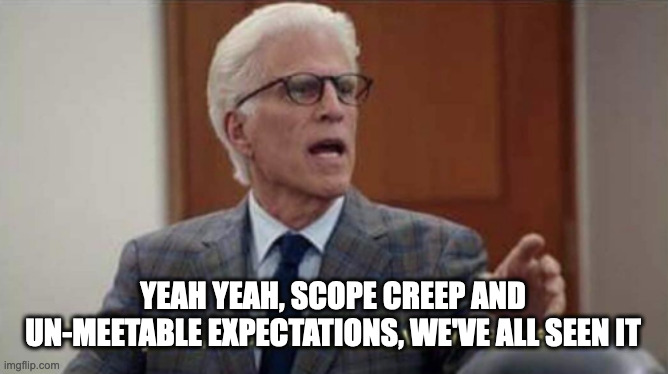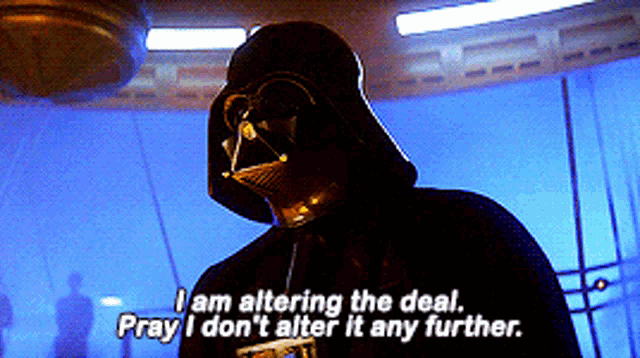Sometimes your academic project suffers from a lack of clear documentation of expectations. I recently watched Mike Monteiro’s talk “F*ck You, Pay Me,” which is aimed at creative freelance and small business people (think web design and graphic design and copywriting and things like that), and I realized that hey, I know this particular heck from library and educational technology projects.
It’s not that all projects I’ve worked on in academic project spaces have been messes: far from it! But over and over in academic spaces, people are glad when I ask for clear expectations, when I bring along documents and other tools for getting us to clear and shared expectations, when I am gently firm about getting these expectations recorded. Why are they so happy about it? And why are some people I worked with so disinclined to set clear expectations?

I’ve done waterfall project management: I know how useful project charters, scope statements, and other expectation management elements are. Monteiro and his attorney put forward that when the scope changes massively mid-contract, you close out the contract and start a new one, or at least renegotiate your contract with an amended statement of work. Applying that principle, that when scope changes sufficiently, you stop and re-negotiate, is a real power-up to academic project work.
As it is, many academic projects don’t have as much gathered together in one place in a written document as you’d expect. So many of us in higher ed didn’t get in to habits of working out shared expectations at the start and documenting them, or were discouraged from doing so at various times. In the small colleges environments that I come from, there is a certain category of academics who does not want to be limited in their creativity by such things. Some folks, both faculty and academic support staff, feel it isn’t nice to press for expectations to be documented up front, or that it will be called wasted time if they gather together the kinds of scope and role notes that we leave strewn about in our email threads, meeting agendas, and other documents for a project. And some of the people who would love to set shared expectations aren’t sure where to begin!
But boy howdy, some of the best work I’ve done in both informal and formal situations has been the most couched in shared expectations from the start. From setting up the NESCLiC collaboration to our work on designing and working with memoranda of understanding for faculty purchased NAS devices on the Mount Holyoke Campus, the name of the game was getting things on paper, getting expectations written down, and then teaching each other how to explain these expectations to other parties we might interact with. For faculty with NAS devices at MHC, the MOU is a document they can point to in the event of staff turnover, or use to refresh their own memory. For the NESCLiC members and prospective members, the statement of intent letter samples are ways you can show your administrators what sorts of things to expect from the partnership and exactly what they’re signing up for and why it’s valuable.
I worked as an instructional technologist for a number of years on programs where we would have a student worker partnering with an instructor, to support one of their courses that was using a learning technology, and mentor the students taking the course in the use of that technology. The key document in this program was an expectations worksheet. It was re-writable for a lot of situations, because the potential scope of these “Technology Mentor” projects could be a variety of things. I would have used it with every student employee if I could have, and when agreeing to be a student’s research advisor we absolutely wrote a version of it to nail down our expectations. It helped us to get a lot of things down on paper that many people leave scattered like breadcrumbs through a trail of emails, faulty human memories of verbal conversations, written notes in journals and google documents, etc.
I don’t think there has to, or should be, or can be, perfect parallelism between creative freelance work contracts and academic project contracts, and “F*** you, pay me” is not something that came up in salaried academic project work anyway, it’s about contract work. But I have become a fan of sitting with the awkwardness of asking for us to get expectations on paper, and I like collecting examples of good expectation setting.
What if someone balks at writing these things down? It’s good to know that, though the reason may be any number of things. It doesn’t necessarily tell you that something’s wrong: they may be unfamiliar with these sorts of expectation setting processes, or worried they’re going to corner themselves. They may be afraid it will squelch creativity. And yes, there are some who resist because it curtails power they have over you and other project team members.

You don’t have to figure out which reason is causing your colleague to balk at expectation setting: you may never figure out which it is, in some cases. But making the case for writing down shared expectations, and getting as much as you can on paper, will help you to work through those potential conflicts of goal, interest, and style. Can we write down what we would plan to do, if scope creeps or changes in a big way, to renegotiate expectations? Are there particular moments that we would know we need to renegotiate? That’s something I’ve never written into an expectations document before, but because I know, now, that creative workers can write that into a contract, I want to write it into academic project work. (And yes, as a contract worker these days, I want that early window into what might be a severe style mismatch or a reason to refer someone to a better fit or simply say no.)
So to all of my fellows who want things on paper? I salute you, let’s trade some boilerplate and sample documents some time. And to Mike Monteiro and his colleagues who made “F*ck You, Pay Me,” I say a big f****** thank you for getting me thinking about this in the context of academic project work.